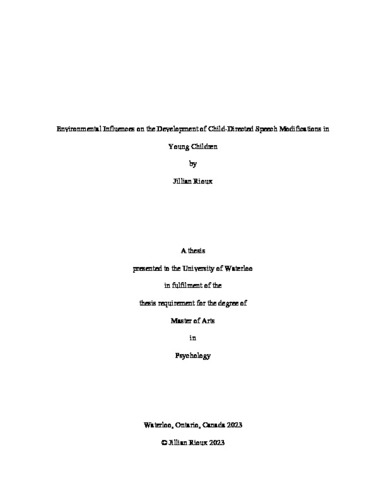| dc.description.abstract | Background. Siblings play a big role in our early lives. Having an older sibling has been shown
to contribute to later-born children’s socio-emotional understanding and prosocial skill
development (Barr & Hayne, 2003; Brody, 1998; Dai & Heckman, 2013; Downey & Condron,
2004; Kheirkhah & Cekaite, 2018). However, their influence is often overlooked in the domain
of language. In particular, it’s unknown whether older siblings contribute to later-born children’s
pragmatic abilities, and whether this relationship is influenced by an older sibling’s gender.
Current Research. In this thesis, I focus on the role that older siblings may play in the
development of their younger sibling’s ability to adjust their speech for other listeners. This
influence could potentially happen in two ways: First, older siblings could provide examples of
modifications in their own speech directed towards their younger sibling. From this, younger
siblings may learn to use these modifications with other listeners. Second, older siblings may act
as a “bridge” to a large community of speakers and listeners (Mannle & Tomasello, 1987). If
older siblings are less adept at understanding their younger siblings and accommodating their
speech (than adults are), this may motivate later-born children to work on effective
communication skills so they can be understood.
Methods. This investigation consisted of two parts: An at-home picture completion game, and a
virtual guessing game that was completed over Zoom. In the at-home task, target children
between the ages of 4-6-years-old, their older sibling (if applicable), and their caregiver were
asked to direct each other to complete elements of incomplete images. In an online task via
4
Zoom, target children were asked to direct simulated listeners (i.e., a baseline adult, a toddler,
and a non-native accented child) to select the correct target image out of a set of three.
Results. Due to time constraints surrounding data transcription and coding, this thesis focuses on
the data from the at-home task. Older siblings had a significantly higher pitch and greater
proportion of attention-grabbing devices when speaking to their younger sibling vs. their parent.
Most notably, their speech to younger siblings was also more fluent (e.g., fewer “uhhs” and
“umms”) than their speech to parents. Moreover, these patterns held for both older female and
older male siblings, suggesting that there are no gender differences in children’s ability to
modify their speech for a younger listener.
Implications. The findings from the first half of this two-part investigation demonstrate that,
during a structured task, older siblings do modify their speech for their later-born siblings, and
most notably, speak more fluently than when speaking to their caregiver. This both replicates and
extends previous demonstrations of older siblings’ abilities to modify their speech for their
younger siblings. | en |

